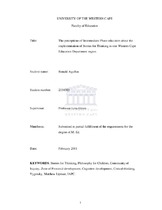| dc.contributor.advisor | Green, Lena | |
| dc.contributor.author | Agulhas, Ronald | |
| dc.contributor.other | NULL | |
| dc.contributor.other | Faculty of Education | |
| dc.date.accessioned | 2013-07-18T11:57:01Z | |
| dc.date.available | 2012/12/13 15:59 | |
| dc.date.available | 2012/12/13 | |
| dc.date.available | 2013-07-18T11:57:01Z | |
| dc.date.issued | 2011 | |
| dc.identifier.uri | http://hdl.handle.net/11394/1683 | |
| dc.description | Magister Educationis - MEd | en_US |
| dc.description.abstract | South Africa had a change in government and in education after the 1994 elections. A new curriculum was introduced and some of the underlying critical outcomes were to develop the learners to become critical thinkers. The methodology by which to teach these outcomes was not clear. An intervention programme, Philosophy for Children (P4C) is used in some countries across the world to promote thinking. Research across the world has shown that this programme has the ability to enhance the cognitive abilities of learners exposed to it. Stories for Thinking (SFT) is an intervention programme based on the principles of Philosophy for Children and was introduced in some schools in an Education District of the Western Cape. This study investigates the perceptions of Intermediate Phase educators about the implementation of Stories for Thinking in this Education District. Educators were asked their strengths and challenges of the approach, their way of using it and the support they received. A qualitative research method was used and data were gathered to answer the research questions by means of questionnaires and interviews. Research findings indicate that educators perceived that Stories for Thinking was able to enhance the reading ability of the learners, it showed a significant improvement in their confidence levels, and a positive change in their general behaviour. Language was seen as a barrier to learning, but the evidence indicates that the community of inquiry can be used as a tool to overcome some of the barriers. It seems as if educators valued the support from the project leaders. It is concluded that this kind of intervention programme is worth introducing as long as all the role-players play their part and the setting is conducive. | en_US |
| dc.language.iso | en | en_US |
| dc.publisher | University of the Western Cape | en_US |
| dc.subject | Stories for thinking | en_US |
| dc.subject | Philosophy for children | en_US |
| dc.subject | Community of inquiry | en_US |
| dc.subject | Zone of Proximal development | en_US |
| dc.subject | Cognitive development | en_US |
| dc.subject | Critical thinking | en_US |
| dc.subject | Vygotsky | en_US |
| dc.subject | Matthew Lipman | en_US |
| dc.subject | IAPC | en_US |
| dc.title | The perceptions of intermediate phase educators about the implementation of stories for thinking in one Western Cape Education Department region | en_US |
| dc.type | Thesis | en_US |
| dc.rights.holder | University of the Western Cape | en_US |
| dc.description.country | South Africa | |

